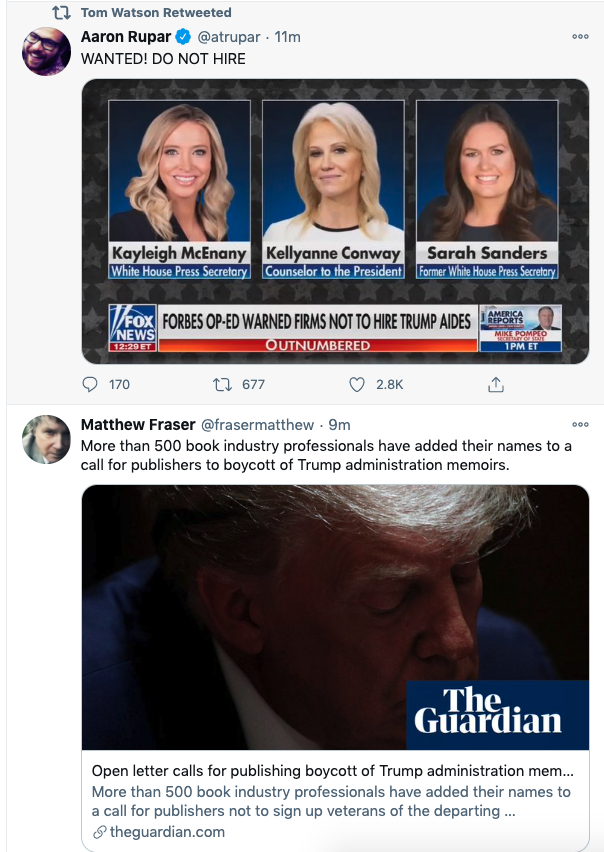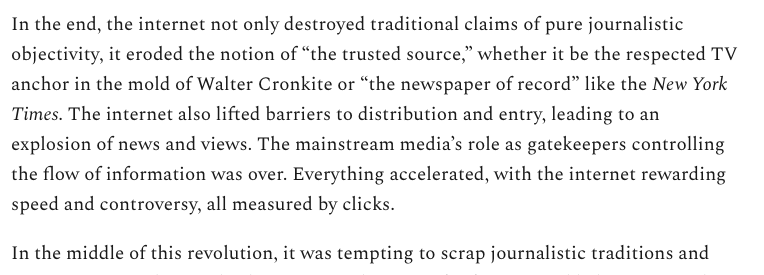
@esglaude Well, @esglaude, since you ask. 😁.... I will start by highly recommending @jkosseff's The Twenty-Six Words that Created the Internet; it is excellent history and explanation. Here is summary: 1/
@esglaude @jkosseff It is #230 that enables the public conversation on the net. In perhaps Congress' last wise move, it recognized that if platforms & publishers were held liable for the public's conversation on the net, they would not host it and we'd be left with nothing but mass media online. 2/
@esglaude @jkosseff As the legislation's authors put it, #230 offers hosts of conversation a shield and a sword. First, the shield: Before #230, case law perversely had it that if you moderated contributions and missed something you were more liable than if you didn't try to moderate at all. 3/
@esglaude @jkosseff That is no longer the case. Under #230, simply, a host is not considered a publisher, is not liable for which the public does on its platform & is free to moderate without increasing liability. It is a recognition that platforms are not media; they host conversations. 4/
@esglaude @jkosseff Thus any platform--or media company--can host public conversation without being liable for what millions may do there but has the ability to moderate what they do there without increasing liability. 5/
@esglaude @jkosseff I emphasize that platforms are not media anyway. They don't assign, write, edit content. They play host to the public's conversation. Some act as if they should be edited like the NYT. But I don't want anyone editing our conversation right now. 6/
@esglaude @jkosseff Without #230, we would not have Facebook, Twitter, YouTube, Reddit, perhaps even Wikipedia, or comments on newspaper sites because the host would be liable to be sued for anything someone might do there. 7/
@esglaude @jkosseff Without #230 we'd be stuck with prior case law and if a host did choose to risk having conversation, it would not moderate that content in any way so as not to increase liability. Then everything would be Parler. 8/
@esglaude @jkosseff My primary concern: Without #230 and without protection for the public conversation, we would not have #blm, #metoo, et al: the voices too long not heard in old, white, male mass media run by people who look and sound like me. I can't emphasize this enough! 9/
@esglaude @jkosseff I'm working on a book on the end of the Gutenberg age. I've seen how the early days of print were highly conversational: Luther in disputation with Popes via print; Erasmus in conversation with More via their books; Luther creating a public by publishing in German. /10
@esglaude @jkosseff With steam-powered presses, cheap paper, the penny press--scale--and end of Habermas' coffee houses and the start of mass media, we lost that ability to converse via media. I argue we are relearning how to hold that conversation with ourselves on the net. 11/
@esglaude @jkosseff What is different about the net is simply this: Anyone who is connected can now speak. That was never the case in history. Scale is our friend for it enables #BLM, #metoo, et al. Scale is our enemy because it makes moderating conversation nigh unto impossible. 12/
@esglaude @jkosseff As in the early days of print, incumbents and authorities concentrate on the bad that is produced and worry about how to control it. Thus the Index Librorum Prohibitorum, licensing laws, popes and princes burning books (and their authors). 13/
@esglaude @jkosseff The first call for papal censorship came in 1470 but not over morals, instead over bad Latin grammar! What was being wished for was not a censor so much quality control. Eventually those institutions were invented: editors & publishers. 14/
@esglaude @jkosseff We are early in the process of renegotiating our norms and likely inventing such institutions for the net. It will take time. According to my calendar, it is only 1475 in Gutenberg years. 15/
@esglaude @jkosseff Thus far, the net has been built just to speak. I celebrate that for voices too long not hear in old, white, male, mass media finally have their press. Yes, so does Q, as in the early days so did witch-hunting conspiracy theorists. 16/
@esglaude @jkosseff Next we need a net that is also built to listen: to help us find that and whom is worth listening to, to help ignore the idiots and conspiracists so we don't waste our time and attention on them, amplifying their lies and hate as media do today. 17/
@esglaude @jkosseff Only when we have a net that is built to speak and listen well can we relearn how to hold a public conversation. My definition & mission for journalism is this: To convene communities into respectful, informed & productive conversation. I wish platforms shared that mission. 18/
@esglaude @jkosseff We will not get there, we will not build the tools for a productive public conversation if we shut down that conversation. That is why I believe in #230. 19/
@esglaude @jkosseff Media are engaged in a moral panic on technology, blaming our ills on social media & technology, as if before Facebook, we were not a racist nation. No, as you say so eloquently, @esglaude, this is us. Social media did not corrupt us. It brought out our best and our worst. 20/
@esglaude @jkosseff BTW, my favorite defintion of moral panic comes from Ashley Crossman:
thoughtco.com/moral-panic-30…
thoughtco.com/moral-panic-30…

@esglaude @jkosseff Mass media are also attacking social media out of unenlightened self-interest: They didn't adjust to a new reality and they blame their failure on their competitors, the technology companies. Media never acknowledge that conflict of interest. 22/
@esglaude @jkosseff Sorry you asked, @esglaude? 😗 In the end, I value the public conversation. I value the voices too long not heard in mass media. I know we have work to do to learn how to better converse (always thus). I do not want to return to the hegemony and control of mass media. 23/
@esglaude @jkosseff You might ask: Why not fix #230? Well, I don't think it's broken; I think it is brilliant law. And I dread--dread!--what would happen to it if this Pandora's box is opened. 24/
@esglaude @jkosseff The right wants to insist that platforms be forced to carry their (hate) speech. Poland has legislation that would require them to carry *all* legal speech. Well, compelled speech is not free speech. The platforms also have a right to choose what to carry & we want them to. 25/
@esglaude @jkosseff The left is going after #230 because they're angry about and distrustful of huge, hubristic, rich tech companies and they're looking for a cudgel: #230 or anti-trust breaking up or privacy laws. It's often an emotional response. 26/
@esglaude @jkosseff I say leave #230 in place. I was part of a high-level working group that made a recommendation for a flexible framework for regulation of the net based on transparency and accountability: 27/ ivir.nl/twg/press-rele…
@esglaude @jkosseff I wish we could have this conversation on media and at least get them to recognize the value of the voices always there but not heard. But they relish conflict: look how they are still giving attention & amplification to Q over the Black women who won this election! 28/
@esglaude @jkosseff Worse, of course, look at Fox and its malign influence on American democracy. That is the media malignancy we should be paying attention to, but media don't like to criticize media. So they blame the public and its platforms. 29/
@esglaude @jkosseff I'll stop here, @esglaude. Thanks for asking. I welcome this opportunity. But I probably would have served you better by pointing to @mmasnick's excellent and evergreen post about #230. 30/ techdirt.com/articles/20200…
• • •
Missing some Tweet in this thread? You can try to
force a refresh





